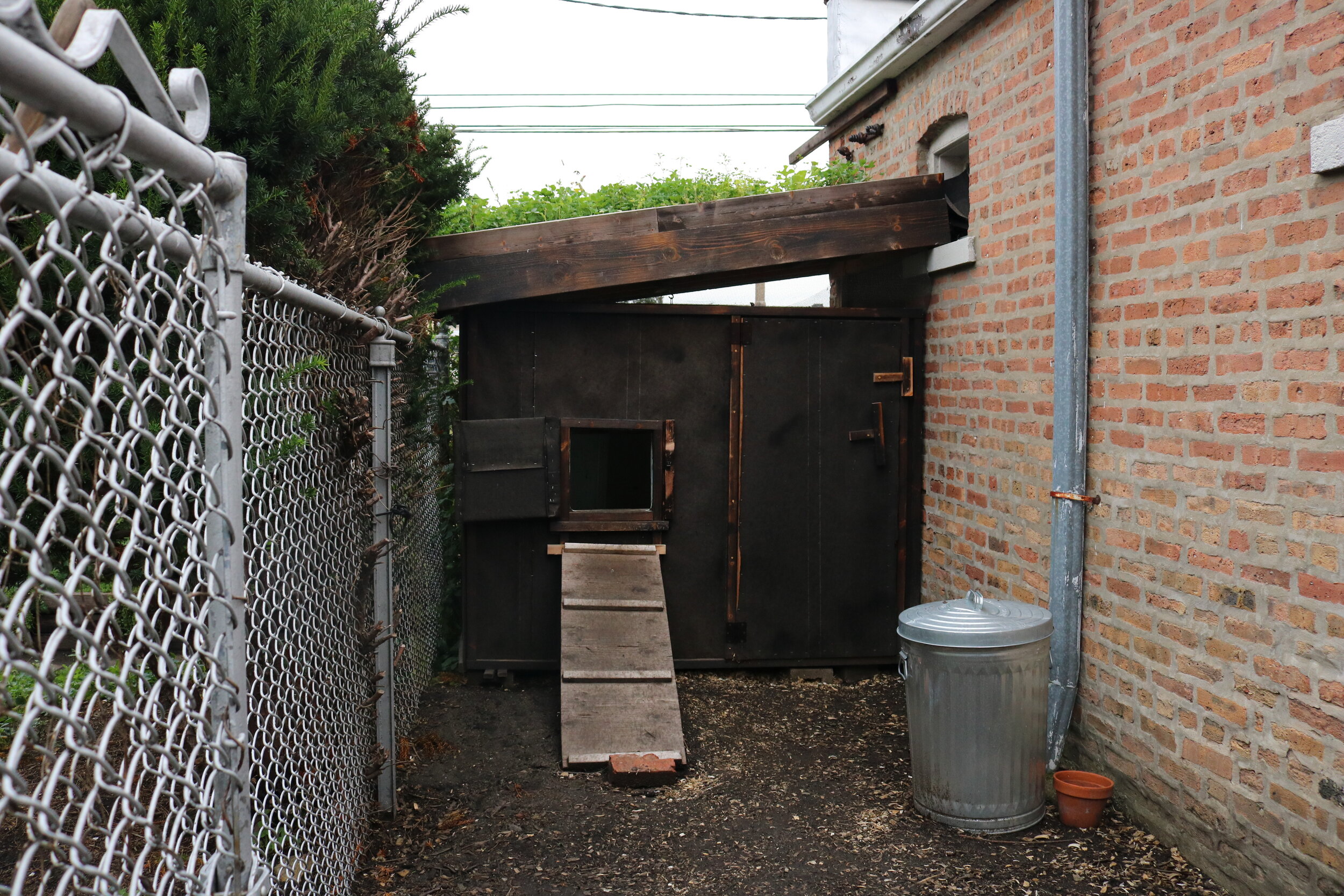Chicagoans showcase backyard chickens amid issues with proposed livestock ordinance
Back in September, Chicagoans across the city opened their yards to visitors for the 2019 Windy City Coop and Eco-yard Tour. Residents from 17 of Chicago’s 50 wards showcased their chicken coops, livestock, backyard gardens and highlighted the importance of urban agriculture in the two-day event.
According to Martha Boyd, director of the Windy City Coop Tour and the program director for Urban Initiative (Chicago) and Eat to Live at the Angelic Organics Learning Center, the coop tour had a clear start in education and advocacy for urban agriculture.
“In 2007, there was, in the City Council of Chicago, an attempt to ban backyard chickens,” Boyd said. “And when we heard about that we thought ‘okay, we understand there’s some concerns about how some people might do this but we don’t think it requires a ban, a total ban on backyard chicken-keeping.’ So we were able to keep that ban from going forward and then after that thought ‘well, now what should we do; we want to educate people so that they do it well; we want to organize so there’s a good, solid network and that people are giving each other good advice.’”
Bronzeville residents James Silvestro and his wife, Sarah Walter, were one of the few homes representing coops on the South Side. According to Silvestro, the couple originally heard about the coop tour through the Chicagoland Chicken Enthusiasts group, an online network for information and resources on raising chickens in Chicago. Silvestro and Walter thought it was a good idea to get involved despite this being their first year raising chickens. For them, being able to showcase their coop, beehive, and vegetable garden was a rewarding experience.
One of Bronzeville resident James Silvestro’s chickens during the coop tour.
“You get an immense amount of joy from raising chickens,” he said. “Like, they’re funny little animals. For sure, it can be expensive raising chickens. It helped that we were able to do it ourselves and we had some extra material, so our upfront costs weren’t massive. But the direct benefits are you don’t have to buy eggs a lot of the time. You can also give eggs to your neighbors. You can sell them if you want so that is a way to recoup costs.”
Monica Brown, who lives near Washington Park, has participated in nine of the last 10 coop tours. It was her love of cooking and the help of a mentor that led her to consider raising chickens. Now, she has several heritage breed chickens that she cares for, all of which she chose because of their different colored eggs. Brown’s chickens live in a coop underneath the deck of the two-flat Brown grew up in and currently lives.
“Learning how to raise some of my food was important to me and has also provided me with a source of recreation in a way,” Brown said. “Recreation and enjoyment. I really enjoy gardening. I enjoy taking care of chickens and the eggs that they produce are fabulous.”
In its ninth year, the Windy City Coop Tour hoped residents like Silvesto and Brown could dispel myths and misconceptions about those who raise urban livestock in the city. This comes amid a proposed ordinance, officially called the Chicago Livestock Ordinance (O2019-7576), headed by Alderman Raymond Lopez (15th Ward) and Alderman Anthony Napolitano (41st Ward) that would severely limit Chicagoans’ ability to raise urban livestock. The ordinance was originally proposed after Chicago Animal Care and Control broke up an alleged cockfighting ring in West Englewood. Laura Calvert, executive director of Advocates for Urban Agriculture, expressed her disagreement with the response to the cockfighting ring at a recent AUA meeting.
Bronzeville resident James Silvestro’s chicken coop, one of only a few South Side coops in the tour.
“Cockfighting is already illegal here in the city of Chicago, and [the ordinance is] going to put at risk the rooster rescues and animal rescues that are there to take in and shelter those animals,” Calvert said. “So by having a blanket ban there, it's going to put them at risk to up to $500 a day and fines for doing good work. The city also works very collaboratively with these rescues to make sure animals get placed. The other problematic thing about this ordinance is that it can potentially hinder urban agriculture and urban farming by putting it into restricted residential zones.”
Some parts of the ordinance include banning roosters and capping the total number of fowl at six and two for other kinds of livestock. Other stipulations include allowing only single-family or two-flat residences to keep livestock, fines of up to $500 per day for permit violations, and a rule that says those applying for a permit to raise chickens and livestock must notify all residents within 500 feet that they’re applying for said permit. If 51% or more object, the resident can’t receive the permit.
Calvert also talked about how the proposed ordinance surprised AUA and its network. According to Calvert, because Chicago’s “robust urban agriculture community” is effective at providing the public with education and resources, the proposal of the ordinance caught them completely off-guard.
“We were blindsided by the proposal of this ordinance,” Calvert said. “And we know that the existing ordinances that are in place regarding no animal slaughtering, nuisance, noise ordinances and animal welfare ordinances have been effective in mitigating any problem that a neighbor might have with their neighbor keeping livestock. So this ordinance is a little bit like a solution in search of a problem.”
AUA, along with other advocacy groups like Chicoland Chicken Enthusiasts, Little Village Environmental Justice Organization, Urban Growers Collective and more, released a joint statement expressing their opposition to the ordinance stating in part that the ordinance infringes on the rights of residents by limiting what animals they can keep.”
“It puts people at risk for just trying to raise their own food and puts particularly immigrant communities at risk,” Calvert said. “And it will hinder the growth of this community, which is doing really great things in terms of food access and workforce development and food sovereignty. And for what, like, what is the actual problem that's going on?”
Chicagoan James Silvestro’s backyard garden in the Bronzeville neighborhood.
Calvert believes food access, food sovereignty, and food security are large issues in Chicago. According to her, many of the city’s neighborhoods don't have access to fresh food, through systemic racism and disinvestment. Urban agriculture and sustainable living practices are things she says help combat that.
“I think there's environmental impacts about increasing the biodiversity of plants and insects. There’s stormwater mitigation, you know, having healthy soils that can capture and mitigate stormwater instead of having previous surfaces,” Calvert said. “I think it brings people together, it provides job and workforce development opportunities. There's many farms here that are working with youth or adults, returning citizens, to give them a job through the urban agriculture field. So, you know, I think there's public health indicators. We also know that blocks with green spaces can reduce violence in that neighborhood. So it's, it covers, I think, a wide array of benefits.”
Despite the future of coops in Chicago remaining uncertain, groups like AUA say they are committed to fighting the ordinance should it come to a vote. Though, with the statuses of many residents and urban farms raising chickens still up in the air, Brown believes it’s important that all human beings act as stewards of the earth.
“The more we can learn about ecologically friendly practices, including gardening, doing the best we can to literally take care of the earth in general and our immediate environment and the creatures that provide us with food and companionship the better off we will be,” Brown said. “It’s in the news today about climate change; species of animals that are essential to our survival disappearing. So, as much as it is within our power we have a responsibility to find ways to promote the lives of these animals and plants.”




